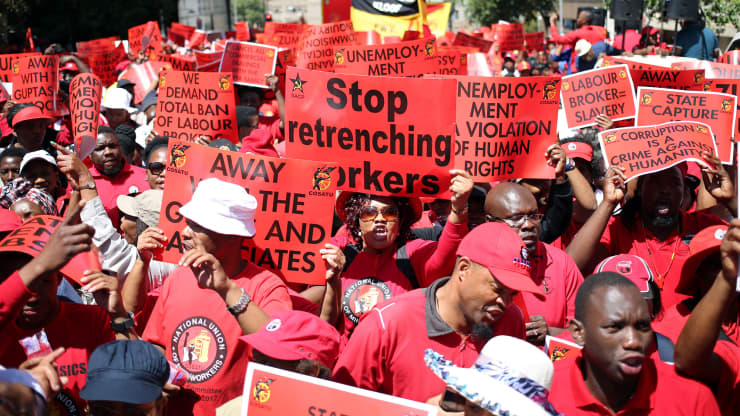THE Congress of South African Trade Unions (Cosatu) has given its support to the proposed National Health Insurance (NHI) – but warned that it should not come at a further cost for the country’s workers.
The NHI Bill is currently undergoing a public consultation process, with a number of healthcare, civil society and political groups presenting on why the new system should or should not be introduced.
Cosatu said South Africa spends 8.5% of its Gross Domestic Product on healthcare.
This is higher than many industrialised and peer nations.
“Half of this is spent on the 16% of society fortunate enough to have medical aid. The other half is spent on public health care for the 84% dependent upon the state. As a result, we have 1st class private health care available for 16% but charged at exorbitant prices and an overwhelmed public health care battling to provide basic health care for 84%,” said Cosatu.
“Consequently, many workers and their families are infected and dying from easily preventable and manageable diseases. Even workers fortunate enough to have a medical, battle to afford to pay the ever-increasing medical tariffs. Most workers’ medical aids are depleted halfway through the year and they are saddled with unaffordable co-payments.”
“The reality is that South Africa’s public and private health care systems are broken and unsustainable. It is critical that the NHI Bill be passed and government move with speed to build a quality NHI which will guarantee universal health coverage for all South Africans. Internationally the equivalents of an NHI have worked well and provided positive models for South Africa.”
In its presentation to parliament this week, Cosatu said that the NHI must be funded via:
- – General revenue, taxes on high-earning self-employed individuals, payroll linked progressive contribution tax, tax on high earning individual taxpayers and contribution by employers;
- – There must be no additional levies through VAT;
- – There must be no co-payments as those who can afford to pay, will have via employee taxes;
- – Tax subsidies to medical scheme members should be brought to an end;
- – The NHI Fund must be publicly-funded and administered with no outsourcing of administration.
The trade federation added that general national revenue will play a key role in financing NHI, and that additional funding mechanisms will be needed over and above the tax hikes.
“Economic growth is critical to increasing revenue, especially with competing & pressing pressures. The tax net will need to be expanded and made more progressive and new taxes targeted at the wealthy,” it said.
In a separate presentation, civil society group AfriForum slammed the proposed introduction of the NHI, saying it will lead to the nationalisation and monopolisation of the health sector, as well as the elimination of private medical funds.
AfriForum provided a number of reasons why this bill would be catastrophic for South Africa. The civil rights organisation argued that the proposed bill, like other state-owned companies, would be susceptible to corruption and maladministration, and also that its implementation would be unaffordable for the taxpayer and would lead to the mass emigration of health workers.
“The government is using NHI as way of garnering votes from poor South Africans, who have legitimate grievances regarding the quality of health care in South Africa. However, NHI will not solve these problems.
“On the contrary, it will lessen the total access to quality health care by destroying the private health care sector,” Reiner Duvenage, AfriForum’s campaign officer for Strategy and Content, said during his presentation.
“NHI is a project for which the true costs and service needs are completely unknown, but despite this, is still being foisted on the already over-burdened taxpayer. By looking at the track record of state-owned monopoly enterprises, NHI will be severely burdened by corruption, excessive bureaucracy, mismanagement and inefficiency,” Duvenage concluded.
- * BusinessTech

